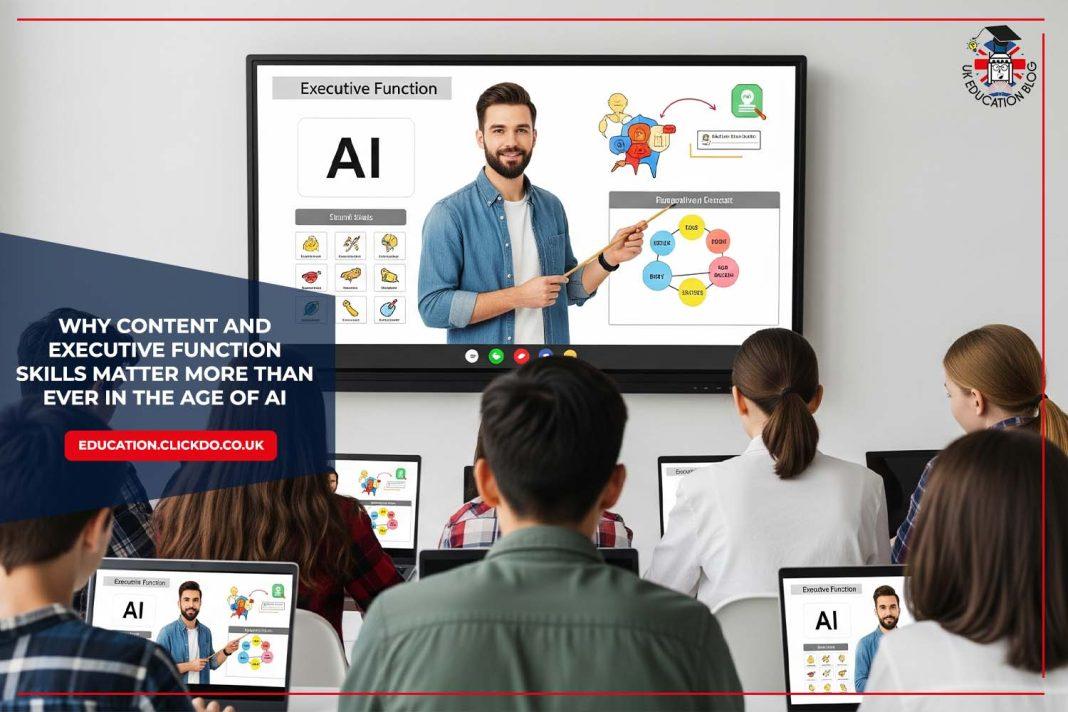In an era defined by digital tools, instant information, and artificial intelligence, one might ask: Is it still necessary to memorise facts or understand academic content in depth?
With smartphones in our pockets and tools like ChatGPT answering questions in seconds, it’s a fair question. But in 2025, as both technology and education evolve, the value of content knowledge remains essential—especially when paired with executive functioning skills like planning, time management, and working memory.
Together, content knowledge and executive functioning form the backbone of independent learning, critical thinking, and real-world decision-making.
Why Content Still Counts

There’s a growing temptation to rely solely on external tools for knowledge. After all, if you can look up a date, formula, or definition instantly, why learn it? But education is not just about recall; it’s about forming mental frameworks that support understanding, reasoning, and analysis.
Knowing key facts, vocabulary, and concepts allows students to process new information more efficiently, engage meaningfully with complex ideas, develop arguments and critique sources, and identify gaps in logic or misinformation. Without content knowledge, skills like evaluation and synthesis have no foundation.
Skills Need a Scaffold
Skills-based education—like creativity, collaboration, and critical thinking—has become a popular focus. But these skills are not developed in isolation. They are built on a bedrock of domain-specific knowledge.
For example, to analyse a Shakespeare play, students need an understanding of literary devices, historical context, and character arcs. To solve a real-world maths problem, they need fluency in formulas and operations. To debate climate policy, they need a grasp of environmental science and political systems. Knowledge and skills work together. The more you know, the more you can do with what you know.
Executive Functioning: The Missing Link

While knowledge and critical thinking are vital, they need to be supported by strong executive function skills. These include the ability to plan and organise tasks, prioritise assignments, manage time effectively, recall information when needed (working memory), and maintain focus over extended periods.
Students who lack these skills may struggle to complete homework, forget important deadlines, or underperform in exams—not because they lack intelligence or content knowledge, but because they find it hard to manage the learning process.
In today’s environment, executive functioning is just as important as knowing the material. The best students aren’t just those who know the most—they’re the ones who can structure their time, stay focused, and apply what they know under pressure.
Technology as a Tool, Not a Crutch
AI tools like ChatGPT and search engines have their place in modern learning. They are useful for research, drafting, revision, and clarification. But over-reliance on technology can undermine long-term learning and confidence.
In classroom settings, students who habitually depend on external answers may struggle to recall foundational knowledge in exams or real-world settings where devices aren’t always available.
Instead, technology should be used to reinforce learning through interactive revision, extend understanding with simulations or examples, and support independent enquiry and creativity. When supported by executive functioning, students can use digital tools wisely, not passively.
A Balanced Educational Approach

At Battersea House for example, tutors aim to strike a balance between teaching essential content and developing the skills students need to thrive. Students receive instruction that builds deep understanding while also improving their ability to plan, recall, and stay organised.
This dual focus is especially important for exam preparation, where both knowledge and technique are needed, university readiness, where students must apply learning independently, and real-life decisions, where judgment, context, and reasoning all come into play.
Supporting Students in 2025
In a fast-changing world, the goal of education should not be to outpace technology, but to work alongside it. Students need the tools to evaluate sources, test claims, and adapt to new challenges—and that begins with a solid grasp of subject content, supported by strong organisational and time management skills.
Online tutoring provides a supportive environment to achieve this. Tutors reinforce classwork, provide targeted explanations, and help students develop practical habits that build long-term academic resilience.
Final Thoughts
The future of education isn’t about choosing between content and skills—it’s about integrating them. Knowledge enables thinking, and thinking deepens knowledge. Executive functioning empowers students to make the most of what they know.
As technology becomes more integrated into daily life, students must be equipped not just to consume information, but to organise it, apply it, and act on it. That’s where balanced, personalised learning makes all the difference.
Author Profile

- Publishing the latest education, EdTech and career news.
Latest entries
 careerFebruary 11, 2026Why the TEFL Certificate is becoming a smart Add-On for UK Graduates and Career Changers
careerFebruary 11, 2026Why the TEFL Certificate is becoming a smart Add-On for UK Graduates and Career Changers DictionaryFebruary 10, 2026What Is AI Literacy?
DictionaryFebruary 10, 2026What Is AI Literacy? DictionaryJanuary 13, 2026Is Trend‑Driven or Evergreen Education Content Winning in 2026?
DictionaryJanuary 13, 2026Is Trend‑Driven or Evergreen Education Content Winning in 2026? DictionaryDecember 16, 2025UK Gen Z Christmas Gifting Trends 2025: Expensive Presents or Meaningful Learning Experiences?
DictionaryDecember 16, 2025UK Gen Z Christmas Gifting Trends 2025: Expensive Presents or Meaningful Learning Experiences?







